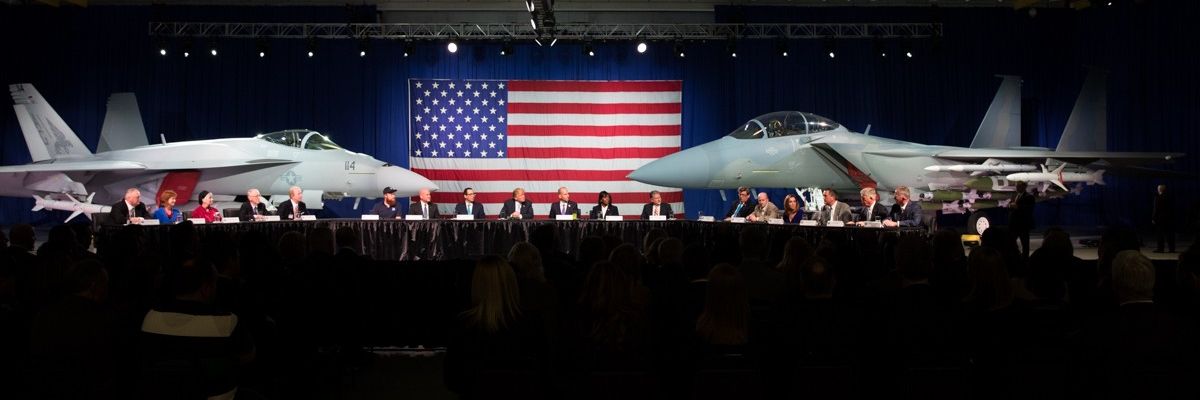Donald Trump’s obsession with arms is in the news again after reports of undue influence over decisions to provide U.S. equipment to Saudi Arabia. And now, according to Sen. Robert Menendez, D-N.J., the ranking member of the Senate Foreign Relations Committee, there is a new deal in the works to sell the Saudi regime thousands of additional precision-guided bombs. The Saudi deals are just one example of a dysfunctional policy that puts the alleged economic benefits of arms sales above human rights and national security concerns.
Sales to Saudi Arabia — which included last year’s offer of Raytheon precision-guided bombs that was pushed through over the objections of Congress — have received renewed attention after House Foreign Affairs Committee Chair Eliot Engel, D-N.Y., revealed that State Department Inspector General Steve Linick was in the midst of an investigation of the circumstances surrounding that deal when he was fired by President Trump. At issue was whether it was appropriate for the administration to declare an emergency to expedite an $8.1 billion package of arms sales to Saudi Arabia, the United Arab Emirates, and Jordan last May. Among the issues under investigation was whether a former Raytheon lobbyist working in the State Department’s legal affairs office was involved in the decision to declare an emergency.
The controversy over the abrupt ending of Linick’s investigation followed on the heels of a New York Times report of Raytheon’s extensive lobbying of White House trade advisor Peter Navarro, who became their staunchest advocate within the administration even as doubts grew about the wisdom of continuing to arm Saudi Arabia in light of its brutal war in Yemen. This same connection has likely been exploited in the crafting of the new bomb sale that was revealed this week.
President Trump’s views on the matter have been made evident on many occasions. He cares more about preserving business for U.S. defense firms like Raytheon, Boeing, and Lockheed Martin than he does about the fate of the people of Yemen or the life of Jamal Khashoggi, who was murdered by the Saudi regime in October 2018. Trump has made extravagant claims about the number of U.S. jobs tied to the Saudi arms trade, at one point asserting that half a million or more Americans were employed producing equipment for that regime. The real figure is less than one-tenth the number claimed by the president.
Even if arms sales to Saudi Arabia were a huge job creator, their economic impact would not justify supplying aircraft, bombs, missiles, and armored vehicles that have enabled Saudi Arabia and the UAE to kill thousands of innocent Yemenis in a war that has now dragged on for over five years. Estimates by the Armed Conflict Location and Event Data project put total deaths in the conflict at over 100,000, with millions more suffering from preventable diseases or on the brink of famine due to destruction of that nation’s basic infrastructure and war-based impediments to the delivery of humanitarian supplies. But due to the corrupt bargain underlying the U.S.-Saudi arms relationship, the arms keep flowing.
Sales to Saudi Arabia are not the only questionable deals being pursued by the Trump administration. According to a new report by the Center for International Policy’s Security Assistance Monitor, the administration made over $85 billion in arms offers last year, the most since President Trump took office. Even the COVID-19 pandemic hasn’t slowed the trade, as the U.S. has made over $11 billion in major arms offers since the beginning of March, including to repressive regimes like the Philippines, Egypt, and the UAE.
Sales to nations with abysmal human rights records and a history of aggression against their neighbors are problematic for three reasons. First, they represent a U.S. government endorsement of the conduct of the regimes in question. Second, there is a high risk that U.S.-supplied weapons will be used to abuse human rights or kill civilians. And last but not least, misuse of U.S. weapons undermines the stability of key countries and regions, to the ultimate detriment of U.S. security.
Congress can and should intervene to stop these dangerous exports, but it is not an easy task. Last year both houses of Congress voted to block the Saudi arms package, only to have their action vetoed by President Trump. Congress needs stronger tools for regulating the weapons trade. For starters, major deals should not go forward without Congressional approval. This would reverse the current approach, in which Congress can only act to stop a sale by a veto proof majority after it has been put forward by the executive branch. If any good is to come of it, the Saudi arms scandal should lead to a greater emphasis on human rights and security concerns over exaggerated economic claims in decisions on which countries should receive U.S. weapons.
















